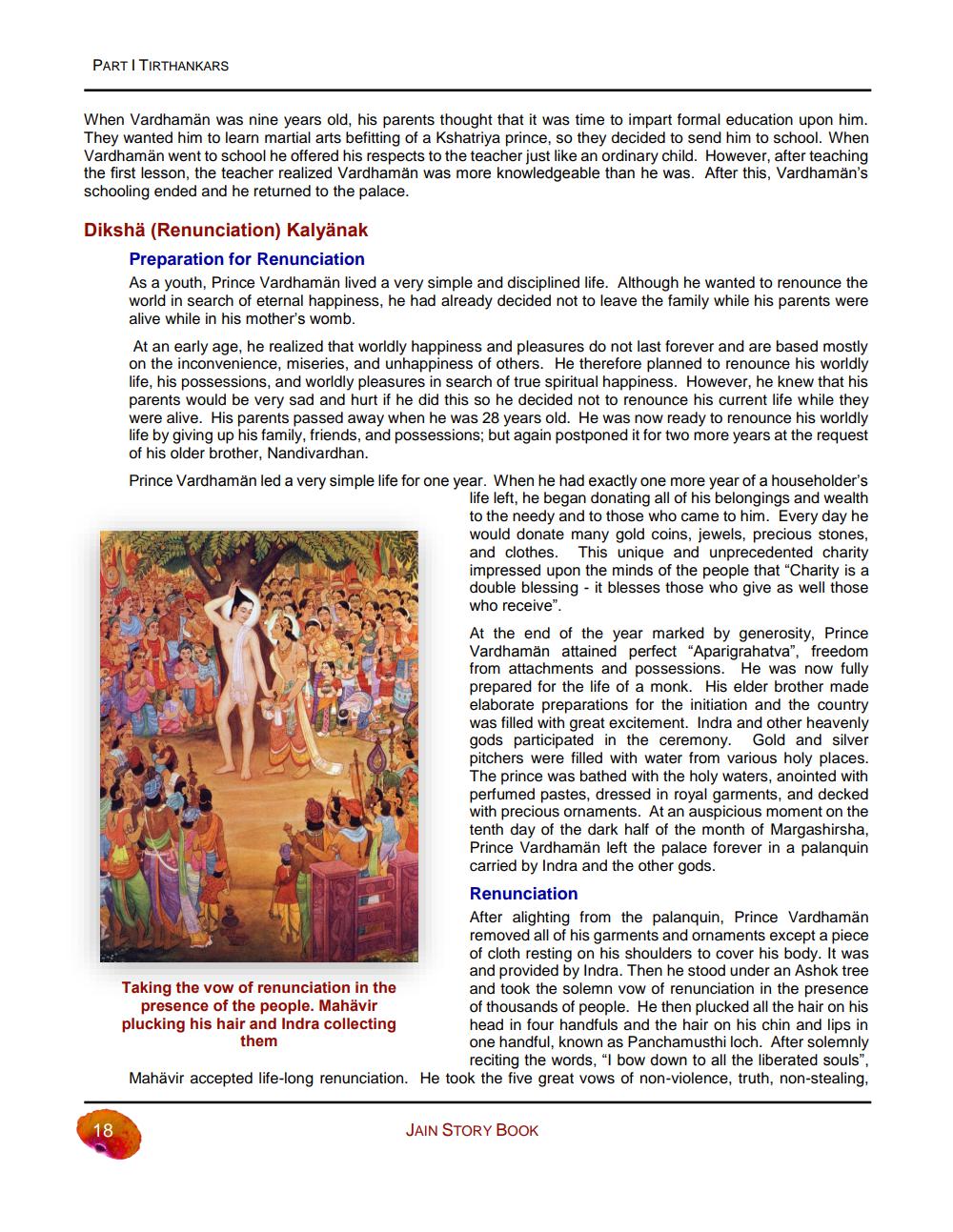________________
PART I TIRTHANKARS
When Vardhaman was nine years old, his parents thought that it was time to impart formal education upon him. They wanted him to learn martial arts befitting of a Kshatriya prince, so they decided to send him to school. When Vardhaman went to school he offered his respects to the teacher just like an ordinary child. However, after teaching the first lesson, the teacher realized Vardhaman was more knowledgeable than he was. After this, Vardhamän's schooling ended and he returned to the palace.
Dikshä (Renunciation) Kalyanak
Preparation for Renunciation As a youth, Prince Vardhamän lived a very simple and disciplined life. Although he wanted to renounce the world in search of eternal happiness, he had already decided not to leave the family while his parents were alive while in his mother's womb. At an early age, he realized that worldly happiness and pleasures do not last forever and are based mostly on the inconvenience, miseries, and unhappiness of others. He therefore planned to renounce his worldly life, his possessions, and worldly pleasures in search of true spiritual happiness. However, he knew that his parents would be very sad and hurt if he did this so he decided not to renounce his current life while they were alive. His parents passed away when he was 28 years old. He was now ready to renounce his worldly life by giving up his family, friends, and possessions, but again postponed it for two more years at the request of his older brother, Nandivardhan. Prince Vardhamän led a very simple life for one year. When he had exactly one more year of a householder's
life left, he began donating all of his belongings and wealth to the needy and to those who came to him. Every day he would donate many gold coins, jewels, precious stones, and clothes. This unique and unprecedented charity impressed upon the minds of the people that "Charity is a double blessing - it blesses those who give as well those who receive". At the end of the year marked by generosity, Prince Vardhamän attained perfect "Aparigrahatva", freedom from attachments and possessions. He was now fully prepared for the life of a monk. His elder brother made elaborate preparations for the initiation and the country was filled with great excitement. Indra and other heavenly gods participated in the ceremony. Gold and silver pitchers were filled with water from various holy places. The prince was bathed with the holy waters, anointed with perfumed pastes, dressed in royal garments, and decked with precious ornaments. At an auspicious moment on the tenth day of the dark half of the month of Margashirsha, Prince Vardhamän left the palace forever in a palanquin carried by Indra and the other gods. Renunciation After alighting from the palanquin, Prince Vardhamän removed all of his garments and ornaments except a piece of cloth resting on his shoulders to cover his body. It was
and provided by Indra. Then he stood under an Ashok tree Taking the vow of renunciation in the
and took the solemn vow of renunciation in the presence presence of the people. Mahävir
of thousands of people. He then plucked all the hair on his plucking his hair and Indra collecting
head in four handfuls and the hair on his chin and lips in them
one handful, known as Panchamusthi loch. After solemnly
reciting the words, "I bow down to all the liberated souls", Mahävir accepted life-long renunciation. He took the five great vows of non-violence, truth, non-stealing,
JAIN STORY BOOK




